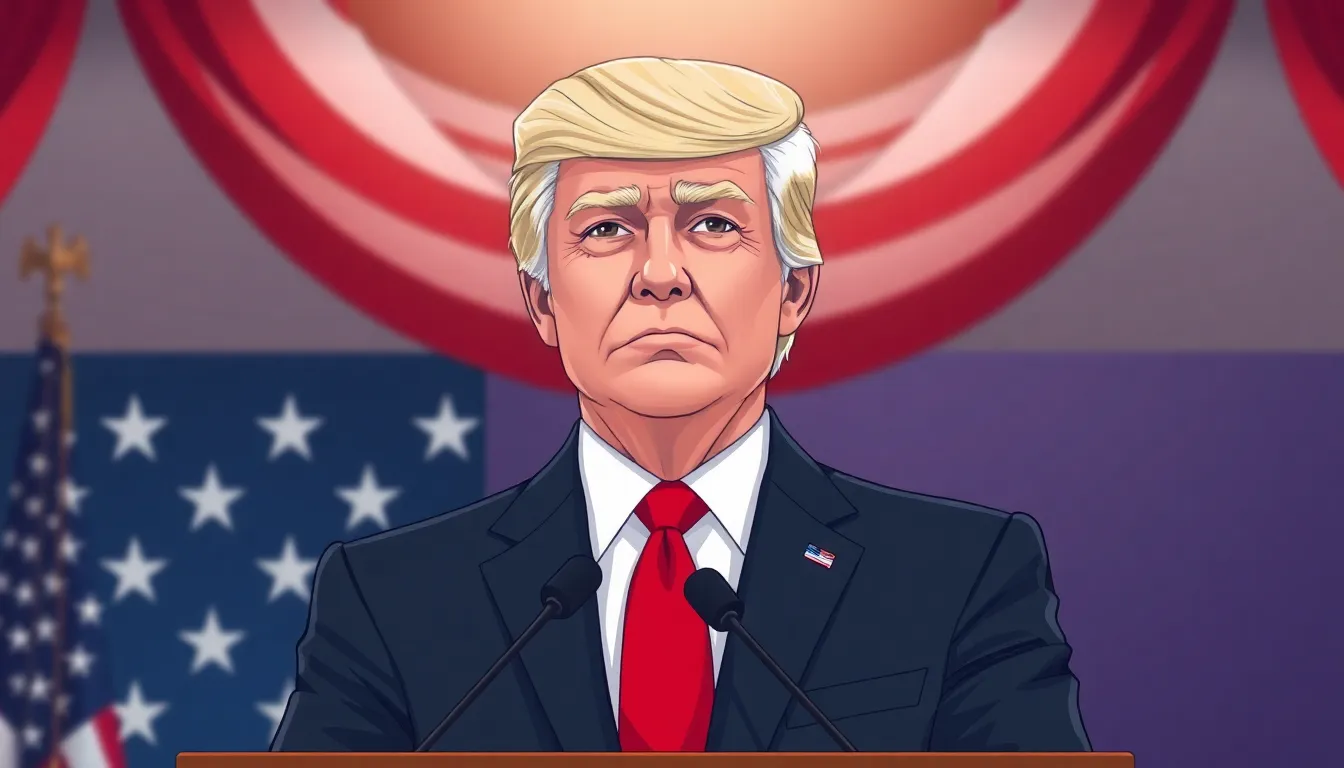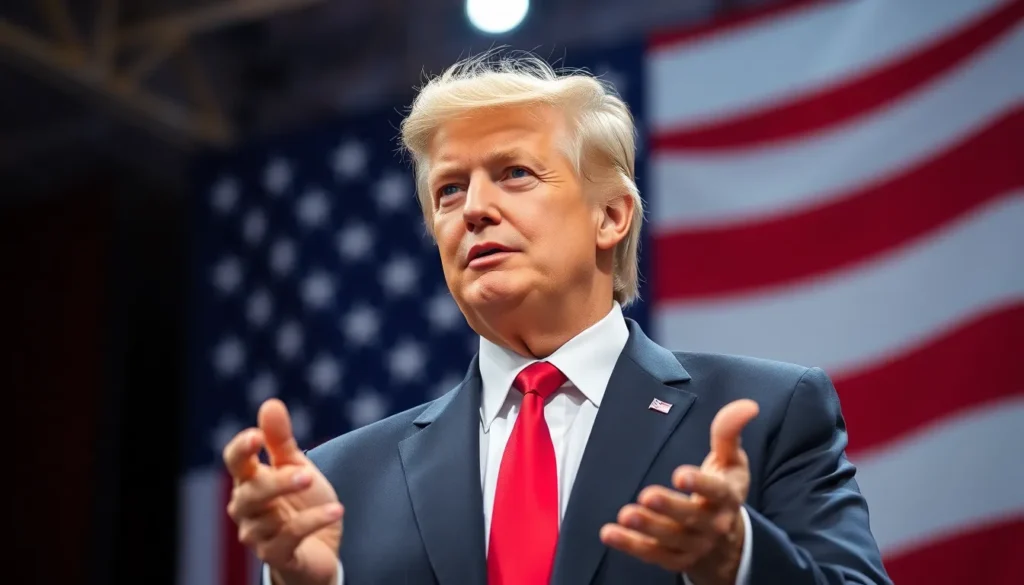Table of Contents
ToggleWhen it comes to Donald Trump, the political landscape can feel like a game of musical chairs. Is he a steadfast Republican or a secret Democrat in disguise? With his trademark bravado and penchant for controversy, he’s kept everyone guessing. One minute he’s rallying the GOP faithful, and the next, he’s tossing around ideas that make traditional party lines blur like a watercolor painting.
Navigating Trump’s political identity is like trying to catch a greased pig at a county fair. His unpredictable stances and ever-evolving affiliations leave many scratching their heads. Whether you love him or loathe him, understanding where he fits in the political spectrum is crucial. Buckle up as we dive into the whirlwind of opinions and facts that define Trump’s party allegiance.
Overview of Political Affiliations
Donald Trump’s political affiliations have sparked considerable discussion. Initially a registered Democrat, he changed his party affiliation to Republican in 1987. His transition toward the Republican Party coincided with his rising prominence in business and media.
Engagements with both parties occurred throughout his career. For instance, Trump has voiced support for Democratic policies on specific issues such as healthcare and taxation in the past. Many perceive his support for certain social issues as indicative of a more moderate stance than traditional Republicans.
Political analysts highlight Trump’s unique approach to party loyalty. Despite his firm allegiance to Republican candidates during his presidency, his policies sometimes diverged from typical GOP platforms. This unpredictability has led many observers to label him a populist rather than a strict party follower.
Party affiliation under Trump often defies conventional analysis. He has faced criticism from establishment Republicans while enjoying unwavering support from grassroots voters. Supporters appreciate his outsider status, which they believe revitalizes the party and attracts broader appeal.
Voter behavior illustrates the complexity of Trump’s political trajectory. Many Republicans align with his ideologies despite their past preferences. Conversely, some Democrats exhibit admiration for his business acumen, complicating the binary classification of his political identity.
Cultural factors play a crucial role in shaping public perception of Trump’s affiliations. Nationalism and economic populism define his base, resonating deeply with a segment of American voters. Understanding these elements contributes significantly to a comprehensive picture of Trump’s position within the political arena.
Donald Trump’s Political Journey

Donald Trump’s political journey is marked by significant shifts and evolving views that raise questions about his true party allegiance.
Early Political Views
Trump’s early political views reflected an inclination toward Democratic values. He supported social programs like healthcare and advocated for more progressive taxation. His stance on certain issues resonated with many Democrats, especially regarding welfare and infrastructure improvements. Influenced by the political climate of the 1980s, he often collaborated with Democratic leaders, which established a foundation for his later political maneuvers. This period laid the groundwork for his eventual transformation into a more conservative figure.
Shift in Party Affiliation
In 1987, Trump made a pivotal decision to switch from the Democratic Party to the Republican Party. Motivated by the desire for broader business opportunities, he aligned with the GOP as it began to embrace a pro-business agenda. This transition coincided with his rising celebrity status in media, solidifying his connection to the Republican base. His policies, however, sometimes diverged from traditional Republican ideals. By adopting a populist stance, he managed to attract a diverse support group while still facing skepticism from some establishment Republicans. This shift illustrates the complexity of his political identity.
Republican Ideology
Republican ideology centers on principles such as limited government, individual liberties, free markets, and strong national defense. Many conservatives advocate for lower taxes, personal responsibility, and traditional values.
Core Beliefs of the Republican Party
Core beliefs of the Republican Party revolve around fiscal conservatism and social conservatism. Limited government intervention in the economy promotes innovation and growth, while personal freedom allows individuals to make choices without excessive regulation. Republicans often prioritize national security measures, advocating for a strong military presence on both domestic and international fronts. Additionally, upholding constitutional rights remains a central tenet, with many members supporting the Second Amendment and emphasizing religious freedom. This array of beliefs shapes the party’s strategies and policies, guiding its approach to governance.
Trump’s Alignment with Republican Values
Trump has aligned with several Republican values, though his approach often incorporates populist elements. Support for tax cuts represents a key alignment, as his administration enacted the Tax Cuts and Jobs Act in 2017. This legislation aimed to stimulate economic growth and benefit businesses. Stance on deregulation further mirrors traditional GOP principles, as Trump sought to eliminate regulations across various industries to foster economic development. Commitment to national defense and border security also reflects Republican tenets, with Trump emphasizing the need for a secure border during his presidency. Although his policies may deviate from conservative orthodoxy at times, Trump’s alignment with core Republican values illustrates his impact on party identity.
Democratic Ideology
Democratic ideology emphasizes social equality and government responsibility in addressing social issues. This party’s core beliefs focus on collective action to promote economic fairness, access to healthcare, and education.
Core Beliefs of the Democratic Party
Democrats espouse several key principles. They advocate for social justice, believing that every individual deserves equal treatment regardless of race, gender, or background. Environmental protection ranks high on their agenda, emphasizing sustainable practices and climate change mitigation. Universal healthcare remains a priority, with many Democrats pushing for systems that ensure all citizens receive necessary medical care. Education funding is also essential, promoting accessible opportunities from early childhood through higher education.
Contrast with Trump’s Policies
Trump’s policies often diverge from traditional Democratic ideals. His administration prioritized tax cuts for businesses, markedly contrasting the Democratic push for increased taxation on wealthier individuals to fund social programs. While Democrats promote comprehensive healthcare access, Trump favored market-driven solutions, opposing initiatives like “Medicare for All.” Trump’s focus on deregulation clashes with Democratic calls for stronger environmental protections. Additionally, populist rhetoric in Trump’s campaigns often centered on nationalism, contrasting sharply with the inclusive ethos championed by Democrats.
Public Perception and Media Representation
Understanding how the public perceives Donald Trump reveals a complex landscape shaped by political allegiances. The Republican Party’s supporters hold diverse views regarding his affiliation and policies.
How Trump is Perceived by Republicans
Many Republicans embrace Trump for his populist message and opposition to establishment politics. Grassroots supporters appreciate his emphasis on nationalism and economic growth. Some critics within the party, however, express concern over his divergence from traditional Republican values. Conventional conservatives highlight his unpredictable behavior and controversial statements, fearing potential damage to the party’s image. Despite these concerns, Trump’s approval ratings among Republican voters often remain strong, illustrating loyalty to his leadership style and policy decisions. His ability to galvanize support at rallies demonstrates his significant influence over the party base.
How Trump is Perceived by Democrats
Democrats largely critique Trump’s policies and rhetoric, viewing him as a threat to social progress and equity. Many associate him with divisive nationalism, arguing it undermines values of inclusion and equality. Some Democrats admire his business background while vehemently opposing his administration’s priorities, particularly in healthcare and environmental regulations. Unity among Democrats often arises during discussions about his impact on democracy and governance. Activists mobilize against his policies, exemplifying resistance to his administration’s agenda. Overall, public perception among Democrats centers on skepticism and opposition, which shapes political discourse surrounding his actions and legacy.
Donald Trump’s political identity remains a topic of debate and analysis. His journey from a registered Democrat to a Republican has left many questioning his true allegiance. While he aligns with core Republican principles, his populist approach and occasional support for Democratic policies complicate the narrative.
Public perception of Trump varies widely. Many Republicans embrace his outsider status and populist message, while Democrats largely critique his policies. Understanding Trump’s position within the political spectrum is crucial for grasping the complexities of modern American politics. His influence on both parties continues to shape the political landscape, reflecting an evolving relationship with traditional party ideologies.




